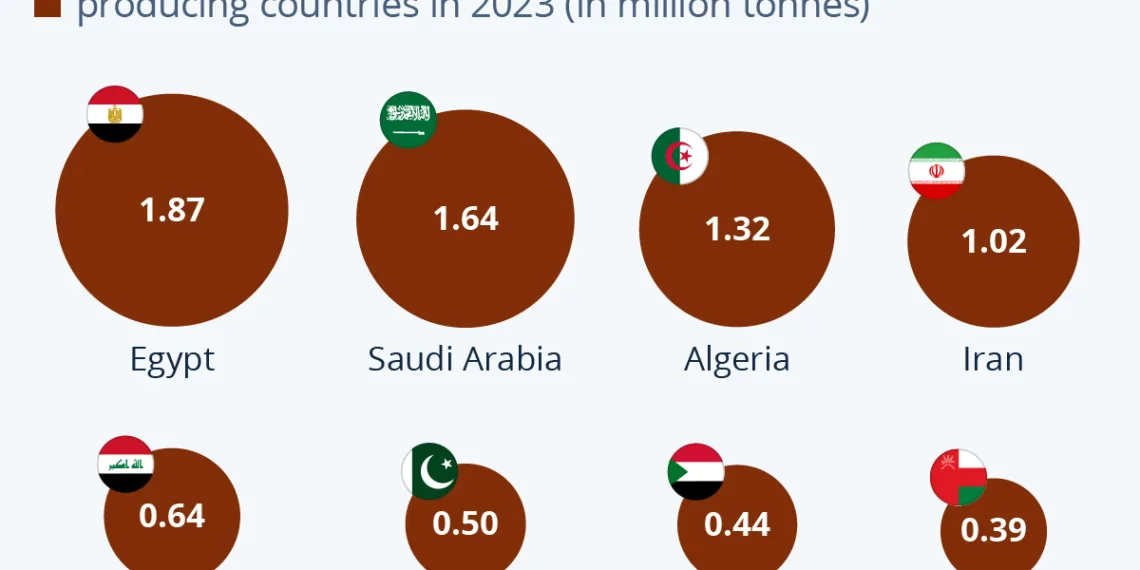Select Language:
The Global Date Production: An Insight Into the Leading Producers
Dates are more than just a delicious fruit; they are deeply embedded in the cultural and social fabric of many regions, particularly in the Middle East and North Africa. As a staple during Ramadan and a symbol of hospitality, the global significance of dates cannot be overstated. This article explores the data surrounding date production worldwide, highlighting the leading countries and the cultural importance of this unique fruit.
The Importance of Dates in Cultural Context
Dates: A Symbol of Hospitality
Dates hold profound significance in various cultures, especially in the Arab world. Their sweetness and nutritional value make them a favored choice for breaking fast during Ramadan. In Oman, for example, the tradition of offering dates to guests alongside coffee signifies warmth and acceptance. This custom transcends mere hospitality, becoming an expression of the cultural values that bind communities together.
Dates in Ceremonies and Celebrations
In addition to their role during Ramadan, dates are often present during significant life events such as weddings and funerals. Their inclusion in these ceremonies reinforces their status as a symbol of prosperity and life, making them essential to both joyous and somber occasions across many cultures.
Global Date Production: A Snapshot of 2023
As of 2023, global date production reached an impressive 9.82 million tonnes, reflecting the fruit’s popularity and the agricultural advancements in its cultivation.
The Leading Producers of Dates
-
Egypt: Topping the list, Egypt produced approximately 1.87 million tonnes of dates in 2023. The country has long been recognized for its agricultural output, leveraging its climate and land for optimal date farming.
-
Saudi Arabia: In second place, Saudi Arabia contributed about 1.64 million tonnes. The country’s investment in agriculture and its climatic conditions make it ideal for date cultivation.
- Algeria: Coming in third, Algeria produced around 1.32 million tonnes of dates. The nation is known for its diverse varieties and the significance of dates in its economy.
The Remaining Top Producers
Following the top three producers, the list continues with countries that play crucial roles in the date market:
- Tunisia: Known for its high-quality dates, Tunisia is an essential player in the industry.
- United Arab Emirates: The UAE rounds out the top five and is recognized for its innovation in date cultivation and processing.
The Geography of Date Production
It’s interesting to note that all of the top eight date-producing countries are situated in the Middle East and North Africa. This geographic concentration highlights the region’s favorable climate and historical reliance on date palms, which thrive in arid conditions.
Agricultural Practices in Date Production
Cultivation Techniques
The cultivation of dates typically involves planting date palm trees, which can reach significant heights and bear fruit for decades. Farmers utilize traditional methods passed down through generations, along with modern agricultural practices that enhance productivity.
Harvesting
Harvesting dates is a labor-intensive process that usually takes place in late summer or early autumn. Workers climb the tall trees to carefully collect the ripe dates, ensuring they are not damaged during the process. The expertise required for harvesting is a testament to the importance of this fruit in local economies.
Economic Impact of Date Production
Employment Opportunities
The date industry plays a significant role in providing employment opportunities, especially in rural regions where agriculture is a primary livelihood. From farming to processing, many individuals rely on the date economy for their daily sustenance.
Export Markets
As a sought-after product in global markets, dates also contribute significantly to export revenues for producing countries. The Middle East, in particular, sees a high demand for dates, not just regionally but also in Western markets where health trends favor natural and nutrient-rich foods.
Sustainability Practices
With the rising emphasis on sustainability in agriculture, many date-producing countries are adopting practices that ensure environmentally friendly farming. This includes the use of organic fertilizers, efficient water management techniques, and research into disease-resistant date palm varieties.
In summary, the world of date production is not only about numbers; it’s a rich tapestry woven from cultural significance, agricultural practices, and economic components, reflecting the timeless appeal of this remarkable fruit.






